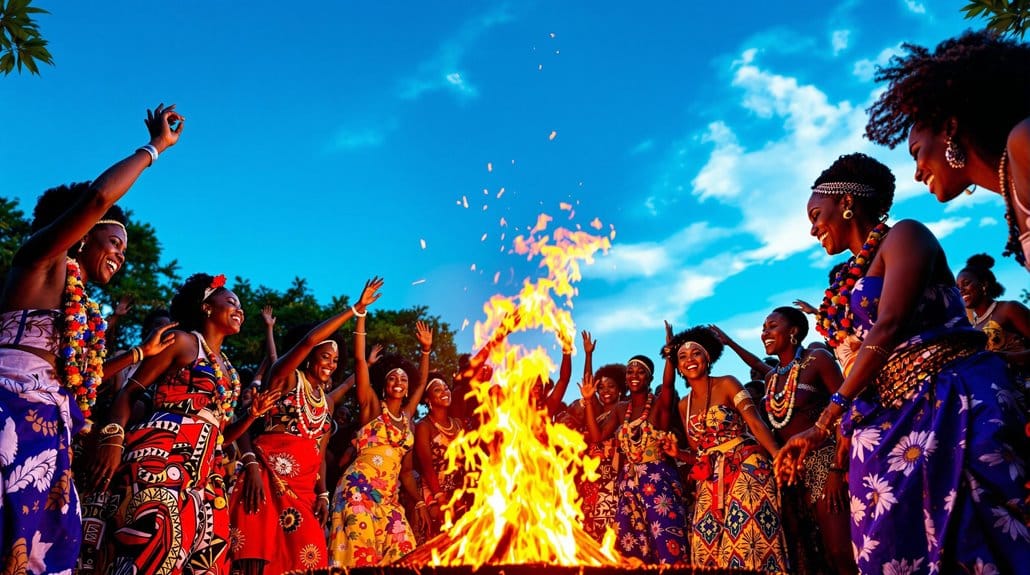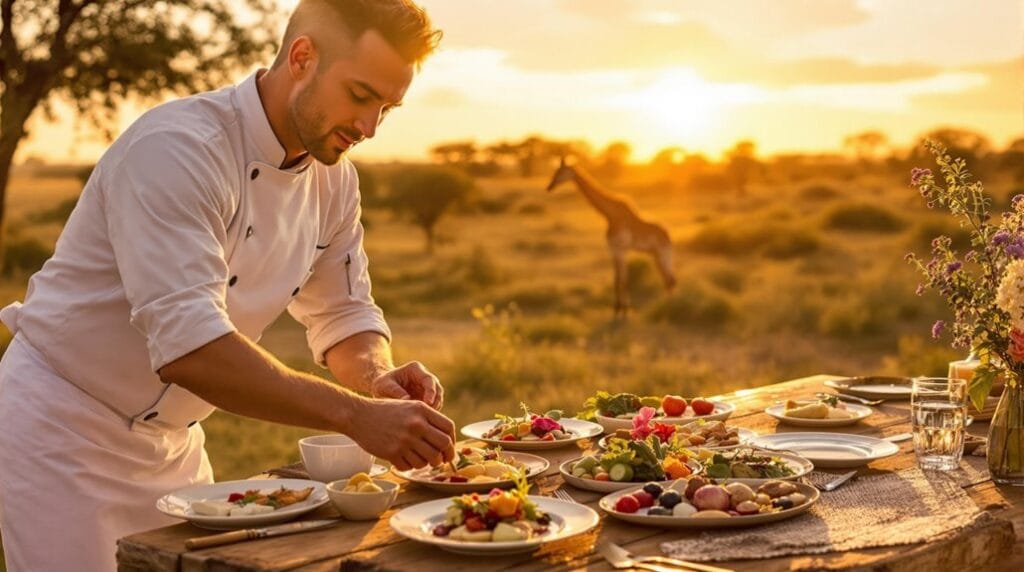Celebrating spiritual festivals of African heritage is crucial for nurturing your cultural identity and strengthening community bonds. These vibrant events enable you to connect with ancestral traditions through music, dance, and storytelling. They also foster unity as community members participate together, sharing experiences and grappling with common issues. Economically, these festivals can boost local economies, attracting tourism and creating jobs. Perhaps most importantly, they provide a space for spiritual reflection, reinforcing beliefs and practices that span generations. You'll find that each festival tells a unique story, illuminating connections between the past and your present circumstances.
Key Takeaways
- Spiritual festivals preserve cultural identity and celebrate the unique traditions of over 3,000 African ethnic groups, fostering a sense of belonging.
- They enhance community cohesion by strengthening social bonds and encouraging collaboration through shared experiences and collective participation.
- These festivals contribute to local economies by attracting tourism, boosting sales for vendors, and creating job opportunities in various sectors.
- They serve as educational platforms, promoting awareness of African heritage and facilitating cultural exchanges that enrich social life and community understanding.
- Spiritual festivals provide spaces for reflection and connection to ancestors, reinforcing spiritual beliefs and creating a sense of hope and renewal within the community.
Importance of Spiritual Festivals
Spiritual festivals often play an important role in shaping cultural identities and strengthening community ties. When you participate in these gatherings, you're not just celebrating; you're engaging in rituals and practices that connect you to African traditions and the rich cultural heritage of your ancestors.
These festivals, like the Ouidah Voodoo Festival and Timkat, serve as crucial cultural markers, celebrating life and shared values through traditional music, dance, and communal feasting.
As you immerse yourself in these events, you help reinforce community cohesion. Spiritual festivals encourage participation from all ages, fostering intergenerational dialogue that keeps cultural narratives alive.
You'll find that these celebrations honor ancestral spirits, creating a bridge between the past and present, while also seeking blessings for future prosperity.
Moreover, engaging in spiritual festivals promotes cultural exchange, allowing diverse communities to share their unique practices, enriching the social life of everyone involved.
In a world where modernization often threatens cultural integrity, these gatherings become significant for preserving traditions and nurturing a sense of belonging.
Types of Celebrations
Celebrations rooted in African heritage are diverse and multifaceted, reflecting the rich tapestry of cultural traditions across the continent. You'll find that these celebrations often embody spiritual beliefs and hold profound cultural significance for local communities.
Agricultural rituals, for instance, aim to secure favorable conditions for crops, while rites of passage mark essential life changes, such as birth, marriage, and death.
Funeral rites are particularly poignant, honoring the deceased and ensuring their legacy lives on within the community, reinforcing connections across generations.
Meanwhile, marriage rituals celebrate the union of couples amidst communal joy, characterized by elaborate ceremonies and feasting that emphasize the importance of community ties.
Festivals dedicated to honoring divinities or cultural heroes serve as vibrant platforms for communal gathering, celebrating shared values and reinforcing cultural identity.
Unique regional events, like the Osun-Osogbo Festival in Nigeria and the Ouidah Voodoo Festival in Benin, encapsulate local customs and spiritual beliefs.
These gatherings promote community engagement through storytelling and sacred rituals, inviting everyone to partake in the richness of African culture and its unique customs, fostering a sense of belonging among participants.
Cultural Significance and Identity
Rooted deeply in the fabric of African cultures, spiritual festivals serve as crucial expressions of collective identity and cultural continuity. These celebrations help renew bonds between ancestors and descendants, reinforcing a shared legacy among over 3,000 ethnic groups. By participating in festivals like Timkat in Ethiopia and the Ouidah Voodoo Festival in Benin, you engage in unique cultural practices that highlight your community's distinct spiritual expressions.
| Cultural Element | Significance |
|---|---|
| Music & Dance | Essential for preserving vibrant cultural expressions and fostering joy. |
| Storytelling | A means to convey ancestral wisdom and history, enriching community ties. |
| Traditional Rituals | Crucial for community engagement and reaffirming cultural identity. |
These festivals emphasize the cyclical nature of life, allowing you to share memories and celebrate heritage. They promote intercultural dialogue, creating understanding among diverse communities. By participating, you reclaim your heritage and contribute to the preservation of traditions, ensuring they remain significant for future generations. In this way, spiritual festivals of African heritage become a powerful means of fostering belonging and unity.
Major African Festivals
Africa's vibrant tapestry of festivals offers a fascinating glimpse into the continent's rich cultural heritage and communal life.
You'll discover that traditional festivals, like the Timkat Festival in Ethiopia and the Ouidah Voodoo Festival in Benin, celebrate spiritual traditions while drawing both locals and international visitors for immersive communal rituals. The Durbar Festival, marking Ramadan's conclusion, features a grand procession of horsemen, showcasing local customs through music, dance, and vibrant attire—an impressive display of cultural pride.
Engaging with festivals like the Gerewol Festival, where Wodaabe courtship rituals unfold, emphasizes community engagement and the beauty of unique traditions.
Similarly, the Osun-Osogbo Festival in Nigeria encapsulates local cultural identity, blending storytelling with sacred rites to reinforce communal bonds. The Cape Town Minstrel Festival exemplifies cultural exchange, uniting diverse musical styles and emphasizing the importance of African heritage in contemporary life.
As you participate in these festivities, you'll feel a profound sense of belonging, connecting with the rhythms of the past and the vibrancy of African cultural expressions.
Each festival becomes a living representation of the community's shared identity and spiritual legacy, inviting you to join the celebration.
Impact on Community and Tourism
Participating in spiritual festivals of African heritage not only enriches personal experiences but also greatly impacts local communities and tourism.
These vibrant celebrations attract thousands of visitors, creating opportunities for cultural exchange and showcasing traditional rituals, music, and arts. As you engage with the rich diversity of African cultures, you contribute to an economic impact that resonates far beyond the festival grounds.
Here are three key effects of these festivals on communities and tourism:
- Boosting Local Economies: Festivals like the Cape Town Minstrel Festival generate income for local artisans, performers, and hospitality services, fostering entrepreneurship within the community.
- Promoting Sustainable Tourism: By respecting and preserving cultural traditions, these events guarantee that tourism benefits local residents, enhancing their pride in their heritage.
- Creating Shared Experiences: The blending of modern tourism with spiritual celebrations forges deeper connections between visitors and local communities, allowing everyone to share in the significance of cultural heritage.
Through your participation, you're not just an observer; you're an active part of a vibrant tapestry that celebrates community pride and strengthens the bonds of cultural understanding.
Preservation of Heritage and Tradition
Spiritual festivals serve as crucial lifelines for the preservation of heritage and tradition, offering communities a dynamic space to celebrate and revitalize their cultural practices. Engaging in these vibrant gatherings allows you to witness the rich tapestry of African diversity, with over 3,000 ethnic groups and 2,000 languages contributing unique rituals and customs.
As you participate, you're not just an observer; you're embodying a legacy that's been passed down through generations.
Events like Timkat and the Ouidah Voodoo Festival showcase the significance of spiritual connections, allowing you to reconnect with your roots and affirm your cultural identity. These festivals are essential for passing down ancestral knowledge, reinforcing community bonds, and guaranteeing that heritage is preserved in the face of modernization.
When younger generations engage with traditional practices in contemporary settings, they cultivate a sense of belonging and pride that strengthens their ties to their heritage.
Frequently Asked Questions
Why Is Spirituality Important in African Culture?
Spirituality's essential in African culture because it shapes your cultural identity and community bonding.
Through spiritual beliefs and oral traditions, you connect with nature and the ancestors, fostering healing practices that promote well-being.
Ritual significance enriches your moral values, guiding daily life and decision-making.
Spiritual leadership offers you support and direction, while transcendental experiences deepen your understanding of existence.
This interconnectedness nurtures a sense of belonging, reinforcing communal ties that transcend generations.
What Is the Importance of Honoring Ancestors in Traditional African Religious Practices?
Ancestor veneration's essential virtues weave together cultural continuity and spiritual connection within African traditions.
By honoring ancestors, you nurture communal unity and affirm your identity, embracing intergenerational wisdom.
These sacred traditions serve as historical remembrance, providing moral guidance and ritual significance.
Engaging in these practices not only strengthens your ties to the past but also enriches your present, fostering a sense of belonging that reverberates through generations in a beautifully interconnected tapestry of life.
Why Is African Traditional Religion Celebrated?
You'll find that African traditional religion is celebrated for its rich tapestry of rituals that forge spiritual connections among community members.
These vibrant gatherings serve as cultural preservation, allowing you to express heritage and affirm identity.
Through seasonal celebrations and ancestral worship, you engage in traditional practices that embody religious symbolism.
What Is the Meaning of African Festival?
An African festival embodies cultural significance, acting as a vibrant community gathering where ancestral rites are honored.
You'll experience seasonal celebrations filled with traditional music, dance rituals, and food offerings that nourish both body and spirit.
The festive attire worn reflects shared identity and pride, while spiritual symbolism weaves through each activity, connecting participants to their heritage.
These festivals foster belonging, inviting you to partake in the rich tapestry of collective memory and joy.
Conclusion
As you immerse yourself in the vibrant rhythms and colors of African spiritual festivals, you'll feel a deep connection to the past and the community. Each celebration pulses with life, weaving tales of identity and heritage. You might just find yourself wondering: what stories lie behind those vibrant masks and dances? By participating, you're not only witnessing history but also becoming part of a living tradition, keeping the spirit of your ancestors alive in every joyous moment.








